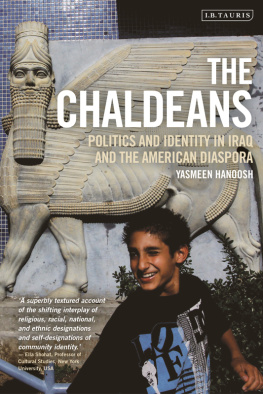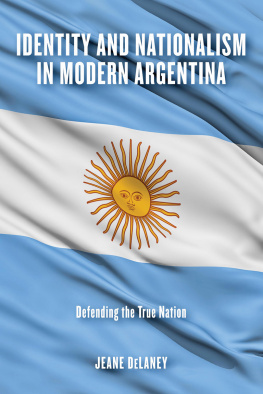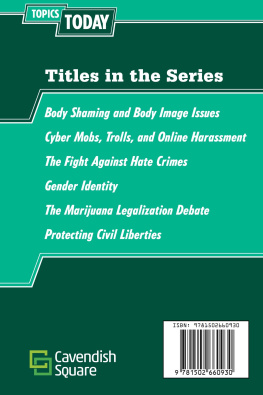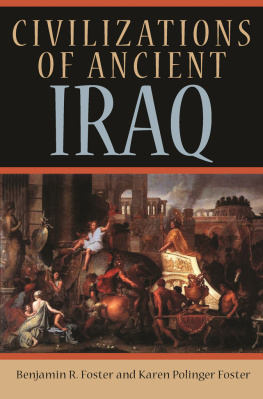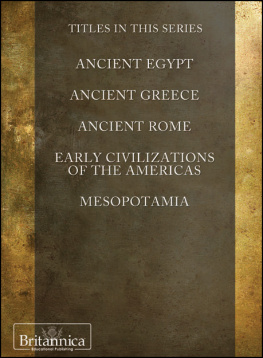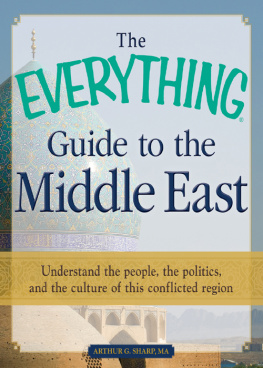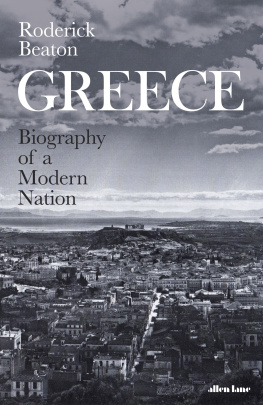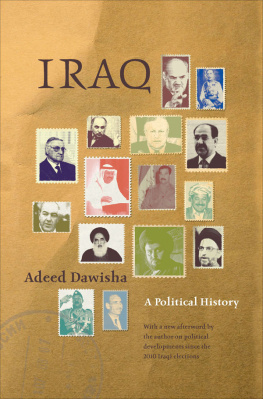THE CHALDEANS
THE CHALDEANS
Politics and Identity in Iraq and the
American Diaspora
Yasmeen Hanoosh

In memory of my mother
Janette
who did not have the luxury to contemplate
her Chaldean identity
The spectre of the ancient Chaldeans and Assyrians stalks this book throughout, and so I must begin by expressing my awe of their civilizations. Without the ancient inhabitants of Mesopotamia, the modern history and collective identity of the living Chaldeans I have tried to understand and discuss in this book would not have been imagined in the same ways. Gratitude to the ancient Chaldeans and Assyrians also necessitates thanking many living Chaldeans and Assyrians, some who have understood the ancients in ways different from mine; others who have inspired me to seek the necessary analytical skills to delve deeper into notions of Chaldeanness; and others still who are part of the theoretical problematic of this book the discourse on monumental history and the vast diasporic Chaldean imaginary.
I have countless individuals and institutions to thank for contributing to my findings. A large number of people welcomed me into their homes, churches, cultural venues and businesses over the course of the decade it took to complete this project. The direct words of Chaldeans and other Iraqis do not appear as often in this text as I would have liked, but the stories, artefacts and knowledge they shared with me inform every argument I make in this book. I am immensely thankful to everyone who agreed to be interviewed. Some names appear below but a larger number of individuals have chosen to remain anonymous a debt of gratitude to all.
First and foremost, I thank Carol Bardenstein, my advisor at the University of Michigan in Ann Arbor, where this book began as a doctoral dissertation. My indebtedness to Carol is enormous. Not only was she a most nurturing dissertation advisor and attentive reader, but she also constantly alerted me to comparative discussions about diaspora, identity and collective memory, ensuring that my research did not become too narrow or antiquated throughout the prolonged period of collecting data and conducting fieldwork. She is one of the rare advisors that graduate students dream of finding and a role model I try to emulate as an associate professor today. I also owe a debt of gratitude to the other members of my dissertation committee, who lent unconditional support and firm guidance on this project. I heartily thank Andrew Shryock for his enormous courage to navigate beyond cultural formats and appearances, and for infecting me with a similar desire. His unconventional and daring insights accompanied me throughout the long writing period. I thank also Kevork Bardakjian, Ernest McCarus and Nadine Nabir for helping me bring the chapters to focus, and for their continual support, patience and encouragement.
Initial work on this project could not have been completed without the various forms of support from the staff of the Graduate Program in the Department of Near Eastern Studies at the University of Michigan, mainly Angela Beskow, Lisa Michelin and the late Margaret Casazza. ZoeAnn Dimond and Kelli Martin provided this indispensable office support later at the Department of World Languages and Literatures, Portland State University.
Along the way towards completing this project, I incurred a great deal of debt to Chaldean institutions and their representatives from Detroit, West Bloomfield, Southfield, Troy and Warren in Michigan for generously sharing valuable information, treasured photographs and papers. Of these institutions I am particularly thankful to the Chaldean Federation of America, the Chaldean American Chamber of Commerce, the Chaldean Cultural Center at Shenandoah Club, the Chaldean News and the Chaldean Iraqi American Association of Michigan. Uncharacteristically many individuals representing these vital institutions kindly took the time to meet or answer my endless questions over phone or email. Of these I single out Vanessa Denha Garmo, Martin Manna, Judy Jonna, Manuel Boji, George Kassab, Jacob Bacall, Amer Fatuhi, Weam Namou and the late Rosemary Antone. To these I add Chaldean immigrants in France, Chaldean refugees stranded in Syria, Jordan and Lebanon, and many Chaldean individuals and families in Michigan, Arizona and California, all of whom contributed to weaving the contents of this book through their stories, anecdotes, referrals, passion for Chaldean history and warm familial hospitality. Not everyone will be flattered by the stark honesty of this book, but I hope they will accept it as a form of tough love. The Chaldeans was my best shot at academic neutrality. It is the highest form of empathy I could offer, so that the struggles this community often witnessed, whether under the Ottoman Empire, Iraq or the United States, may be taken in more earnest by scholars, students and the world at large.
I shared formal and informal discussions about the Chaldean community in Iraq and the United States with many artists, academics and friends who are associated in some capacity or another with Middle Eastern minority identities. This book would not be the same without the incisive input of Deborah al-Najjar, Sinan Antoon, Dunya Mikhail, Samuel Shimon, Dahlia Petrus, Baher Butti, Heather Raffo, Lavon Ammori, Alda Benjamen, Adam Becker, Randa Kayyali, Laura Robson and Arbella Bet-Shlimon. I thank them for their valuable scholarship and artistic products, for their thoughtful comments on my ideas, and for their abiding encouragement through the years that it took to complete this book.
The financial support that sustained this project at various stages of development came from Faculty Enhancement grants at Portland State University, the American Academic Research Institute in Iraq, the International Institute and Rackham Graduate School at the University of Michigan, King-Chavez-Park award, Bentley Historical Librarys Bordin Gillette Researcher Travel Fellowship from Bentley Historical Library, the Arab American National Museums Evelyn Abdalah Menconi grant and a postdoctoral fellowship from Wissenschaftskolleg zu Berlin, Germany. I am also grateful for Freie Universitt Berlin for providing me with office space during my research year in Berlin.
I would be remiss not to mention that during my fieldwork in and around Detroit, I was also greatly assisted by the knowledgeable staff of the Arab American National Museum in Dearborn, Michigan, particularly Matthew Stiffler and Kristen Terry.
The year I spent as a postdoctoral fellow at Wissenschaftskolleg zu Berlin, Germany, offered a much-needed intellectual forum through the stimulating seminar programme Europe in the Middle East/the Middle East in Europe. The weekly seminars shaped and sharpened my ideas for this project. I thank Georges Khalil, the director of this programme, for this rigorous opportunity, and also the other postdoctoral fellows from that year especially Bashir Bashir, Haytham Bahoora, Nazan Maksudyan, Sonali Pahwa and Kirsten Scheid for influencing my work through the cutting-edge theories and ideas they shared.
I could not have asked for more genial and accommodating department chairs than Gina Greco and Jennifer Perlmutter while working on the manuscript of this book. They supported me on every step of the way, making sure that I have access to funding, course-buyouts and workspace to focus on completing my writing project. My colleagues at the Department of World Languages and Literatures, the Migration Research Cluster and the Middle East Studies Center at Portland State University have been a wonderful source of inspiration and support. I am particularly thankful to Enrique Cortez, Isabel Jaen, Anousha Sedighi, Pelin Basi, Steve Thorne, Jon Holt, Craig Epplin, Alexander Sager, Laura Robson, James Grehan and Angela Zagarella for the productive academic environment they foster round me. Finally, I was able to conclude my work on this book thanks to a sabbatical, leave provided to me by PSU and the selfless colleagues at the Arabic programme, Lina Gomaa and Clifford Breadlove, who took on extra teaching and advising responsibilities so I could be free to focus on writing.
Next page
